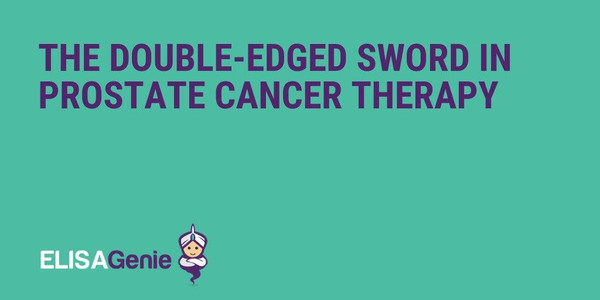The double-edged sword in prostate cancer therapy
By Zoe Angel, PhD Student, Ulster University
Prostate cancer is now the commonest cancer in men and it is the fifth leading cause of death (1). Researchers have strived to understand its development and extraordinary progress has been made in the last 50 years. Better treatments for this disease have been developed and the outlook is steadily improving for prostate cancer patients. Despite this, significant challenges remain in prostate cancer therapy. It remains difficult to accurately predict which tumours are most aggressive and which will respond to treatment. Furthermore, chemotherapeutic approaches have mainly consisted of blocking sex hormone signalling, which has improved patient survival but has not been curative and may even have deleterious consequences. So, is it time to reassess our approach?
The use of androgen ablation in prostate cancer treatment
Treatment for prostate cancer has come a long way since a momentous discovery made by Charles Huggins in the 1940s, which heralded a new era of prostate cancer therapy. Huggins discovered that metastatic prostate cancer was sensitive to loss of the sex hormone androgen, which prostatic cells depend on for growth, and he pioneered a primitive but surprisingly effective treatment for prostate cancer: orchiectomy (surgical castration). Later, characterisation of the androgen receptor lead the way to specific antagonism of the receptor or its downstream effectors. However, therapeutic approaches were limited. If a man with prostate cancer was diagnosed in the 1960s, the standard treatment offered to him would be surgical removal of the prostate, palliative radiotherapy, and anti-androgen therapy. These treatments leave patients with devastating side-effects such as incontinence, impotence, and distress, and barely impacted patient survival. By 2008, survival was improved by dual targeting with anti-androgens and cytotoxic agents. However, the drugs eventually became ineffective and patients relapsed, and this was largely attributed to drug resistance (2).
Now in 2018, a man diagnosed with prostate cancer has numerous options. Increased use of “watchful waiting” and advances in radiotherapy, such as the optimisation of dose and probe-directed radiotherapy (brachytherapy), has tremendously improved the management of clinically localised disease. In terms of chemotherapy, androgen receptor antagonists have largely been replaced with more sophisticated agents that target different elements of the signalling pathway (3). These new agents more efficiently kill cancer cells before they develop resistance, so it is expected that they better prevent drug resistance and provide backup for when first-line treatments fail. But is the sex hormone signalling pathway really the Achilles’ heel of prostate cancer? And is resistance completely to blame for the failure of these drugs?
The deleterious effects of androgen blockage
What is clear from the last 50 years of research is that while androgen blockage initially abolishes a tumour, it has never been curative. This reflects the heterogeneous nature of tumours which must invariably contain a population of cells that do not rely on androgen signalling. These cells will always survive androgen ablation, regardless of how effective the molecule, how early it is administered, and whatever the dose. Moreover, these cells (which are androgen-independent and intrinsically more aggressive) can proliferate without competition and are likely the cells that comprise progressive metastatic prostate cancer.
Androgen blockage also causes particularly low oxygen levels within the tumour. In a murine model, treatment with the anti-androgen bicalutamide was associated with oxygen deprivation (hypoxia) in tumours and with metastasis (4). Hypoxia is a toxic environment that exerts a selective pressure on cancer cells to adapt and survive and may be partly responsible for patient relapse following treatment (5). However, the exact signalling pathways that mediate this remain poorly understood.
Therefore, androgen ablation is a double-edged sword that is initially successful but is associated with relapse with a more aggressive form of the disease.
Future approaches
Looking back, prostate cancer patients’ survival has improved since the 1960s but the reduction in mortality is arguably due to better management of localised disease rather than curing progressive metastatic disease. The sobering reality is that despite a realm of novel drugs and combinations, progressive metastatic prostate cancer is still incurable. Androgen ablation has always been the backbone of prostate cancer therapy but it does not tackle the entire tumour and better anti-androgens will not change this.
My PhD is focused on the role of hypoxia in prostate cancer progression and specifically on microRNA signalling in this setting. MicroRNAs are tiny RNA molecules that regulate essential cell processes and are abnormally expressed in many cancers, driving cancer progression. They are ideal candidates for biomarkers and can be targeted as a treatment strategy. I look forward to advancing the knowledge of microRNAs in prostate cancer development with a view to discover novel biomarkers for aggressive disease, or potential drugs that can be used in combination with androgen ablation to tackle androgen-independent cell populations and reduce deleterious hypoxic signalling.
Bibliography
1) Irish Cancer Society. [accessed 17/01/2018].
2) Denmeade, Samuel R. and John T. Isaacs. 2002. “A History of Prostate Cancer Treatment.” Nature Reviews. Cancer 2(5):389–96.
3) Chang, Albert J., Karen A. Autio, Mack Roach, Howard I. Scher, and Howard I. Scher. 2014. “High-Risk Prostate Cancer-Classification and Therapy.” Nature Reviews. Clinical Oncology 11(6):308–23.
4) Nesbitt, Heather et al. 2017. “The Unidirectional Hypoxia-Activated Prodrug OCT1002 Inhibits Growth and Vascular Development in Castrate-Resistant Prostate Tumors.” The Prostate 77(15):1539–47.
5) Muz, Barabara et al. 2015. “The role of hypoxia in cancer progression, angiogenesis, metastasis, and resistance to therapy.” Hypoxia (Auckl) 3:83-92.
Recent Posts
-
Metabolic Exhaustion: How Mitochondrial Dysfunction Sabotages CAR-T Cell Therapy in Solid Tumors
Imagine engineering a patient's own immune cells into precision-guided missiles against cancer—cells …8th Dec 2025 -
The Powerhouse of Immunity: How Mitochondrial Fitness Fuels the Fight Against Cancer
Why do powerful cancer immunotherapies work wonders for some patients but fail for others? The answe …5th Dec 2025 -
How Cancer Cells Hijack Immune Defenses Through Mitochondrial Transfer
Imagine a battlefield where the enemy doesn't just hide from soldiers—it actively sabotages their we …5th Dec 2025




